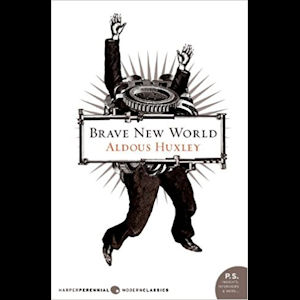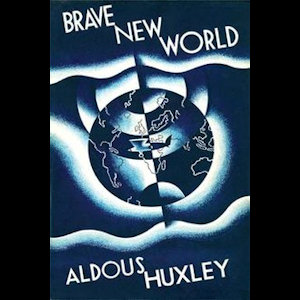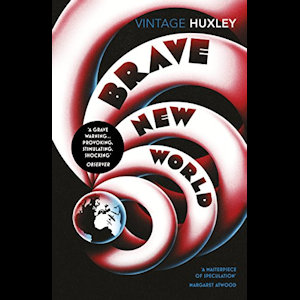Brave New World by Aldous Huxley - Sci-Fi Classic Review
 | | Falling into the machine |
The literature of the early Twentieth Century, well before World War II broke the world's optimism, was absolutely stupid with utopias. Writers claimed the first World War had put an end to conflict, that advances in science and technology would do away with illness both physical and mental, and that the industrial revolution marked the beginning of the end for scarcity and poverty. Futurists of the time were intolerably cheerful, and science-fiction of the time was so upbeat it gives Gene Roddenberry a run for his money.
Into this landscape emerged Aldous Huxley, grandson of Darwin's famous bulldog, T.H. Huxley. Aldous was a vicious social satirist who returned from visits to America in the roaring twenties with visions of a terrible future in which all the problems of civilization are solved by global central planning, perverted science and technology, and the overwhelming apathy of decadence and consumption. With that fresh in his mind, he intended to use his pen to skewer the likes of H.G. Wells, the most famous utopian writer of the time, and thus, over the course of three or four months in 1931, he wrote what would become one of the most influential and prescient works of dystopia ever conceived: Brave New World.
Using liberal amounts of behavioral psychology of the day, the assembly line innovations of Henry Ford, and an unbridled disdain for mindless consumerism, Huxley's future is hypnotic and terrifying. Men and women are carefully divided into classes, grown in bottles, conditioned throughout their childhood to be compliant and happy in their respective roles, and given lifetime supplies of happy pills called soma. Huxley spends his first few chapters very carefully explaining this social order in a way that is as grotesque as it is coldly rational, leaving readers both disgusted and intrigued.
 | | I thought all the planes were helicopters, but whatever |
And though the novel goes on to have a plot familiar to modern audiences--a character who doesn't quite fit in upsets the social order, leading to an ultimate confrontation between philsophical figureheads--the spell never wears off. Huxley's arguments are clear as day, but his inability to offer any solutions to the problems he sees in the future gives the story a bleakness that could make you question whether a future of conformity and dumb happiness isn't, in fact, better than one of quiet desperation.
From a science-fiction standpoint, Brave New World belongs in the science-run-amok category, alongside the works of Mary Shelley and Michael Crichton. Instead of science being misused by a mad scientist bringing life to a stitched-together corpse or by a corporation building a misguided theme park out of extinct animals, though, science is misused here by an all-powerful government to force mankind into a most manageable mould. I think it's safe to say Huxley wasn't a fan of central planning, and in Brave New World, he takes it to an absolute extreme, where every single aspect of society is designed and controlled by a tyrannical central authority to such an extent that the masses aren't even capable of fathoming the concept of liberty. The tyranny here isn't one of force; it's one of conditioning. The masses simply don't want to be free anymore.
In making the case against all-consuming government authority, Huxley also makes the case for the importance of human suffering. The final confrontation between the Savage and Mustapha Mond is dense and demanding, and Huxley pulls no punches in giving Mond a perfectly reasonable perspective for defending the social order. However, for all the cold rationality he gives Mond, Huxley gives an equal amount of passion to the Savage. Readers are inclined to agree with the Savage, as is Huxley, but then, after the confrontation, the Savage quickly descends into utter madness and misery that ultimately ends in his haunting suicide.
 | | This cover is a cool redesign of the last one |
This bitter end separates Brave New World from the vast majority of its modern copycats. While it is certainly not the first notable dystopia, Brave New World is easily the most influential; it has been the standard template for dystopic fiction for nearly a century now. (I'm not going to get into the controversy about whether or not Huxley ripped off Yevgeny Zamyatin's We--it isn't relevant to the point I'm making.) That said, in most dystopian novels (especially of the Young Adult variety), the conclusion is at least moderately upbeat. The dystopic order of things is usually upset enough to make room for change. However, Brave New World doesn't do that. Instead, the dystopia it describes is so powerful it withstands the Savage's relatively pathetic attempts to bring change.
This is both the novel's greatest strength and its biggest weakness. The thesis--that the world is barrelling toward a future of unrelenting tyranny, abject immorality, rigid conformity, and intolerable decadence--is a powerful one that still resonates, but Huxley never even hints at a solution, leaving the novel open to accusations of unbridled cynicism and unconstructive criticism. I wholly support and applaud the critique of Wells and the other utopian writers of the day--and I rush to point out that Brave New World is required reading in schools around the world whereas Men Like Gods remains covered in dust in the few libraries it can be found in--but I can't help but think that maybe Huxley was being lazy in giving his story such a jaded, unsatisfying conclusion.
Don't take that to mean I lack due respect for Huxley and his novel. It is one of the most important books of the Twentieth Century, and one of those stories that has stuck with me since I first read it as a teenager. It is incredibly well-conceived and adeptly written, and it is no less resonant today than it was at the start of the Great Depression, when it was first published. Any fan of dystopic fiction absolutely must read Brave New World, and after reading it, it's hard not to see what Huxley saw in the world around us.
-e. magill 9/27/2018
|
|